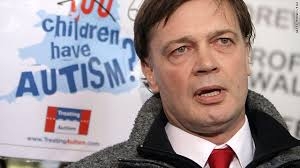Can Vaccination Cause Autism?

Monisha Nundy, MD, HBSc. CCRP
Rumors about the connection between autism and vaccinations surfaced in 1998 when doctor Andrew Wakefield published in the highly rated medical magazine Lancet, a paper describing 12 kids with autism and bowel dysfunction. He claimed that according to their parents, 8 out 12 kids started to develop autism symptoms two weeks after being vaccinated with the MMR vaccine (measles, mumps, and rubella).
The paper gained widespread popularity among professionals and in society. Scientists started to conduct studies in order to support or refute conclusions of Wakefield, and in the case of support - find the reason why vaccination can lead to autism. At the same time, the public, fueled by the possible fear that this research was true, stopped vaccinating their kids.

Many subsequent trials and studies ensued, and scientists could not find any evidence of Wakefield results. Some researchers showed that there was a possible small correlation between vaccination and autism, some did not show any. In 2014, scientists from the University of Sydney demonstrated results of a wide research in which, around 1.3 million children participated. They concluded that autism symptoms appeared equally for vaccinated and non-vaccinated children. At the same time, some interesting details were revealed about original Wakefield paper. He was suspected in receiving money from a law company (Legal Aid Board) which planned to sue the producer of the vaccine (Merck). Vaccination used in studies of children by Wakefield were not necessary and were not approved by ethical committee of the University where he was working. The main - parents of children found and asked by journalist Brian Deer refused to budge from their words which were given them by Wakefield. They said that autism symptoms appeared before vaccination or after, but not after several days, but in half of the year.
In 2010 Lancet published official disproof of Wakefield paper, and UK General Medical Council cancelled his right to practice. But people were still scared. If at 1998 vaccination from measles, rubella and parotitis were given to 91.5% of British kids, at 2004 this number decrease to 80%. As a consequence in 2006 in UK there was a significant rise of measles. It was registered 465 cases of disease (in 1998 it was 42). In spite of a cure, one child died and others had serious problems.
It’s apparent that this paper had a definite impact on families and most importantly the lives of children internationally.
The celebrity Jenny McCarthy blamed her son’s autism on a vaccine. Even after Wakefield’s theory was discredited, she continued to advocate for him.
In an era where measles, mumps and rubella were very much eliminated as a threat, we now see a significant re-emergence due to the public have a misguided sense of what is fact or fiction. As parents, it is important to understand that a paper being ‘published’ does not indicate its validity or truth. Many are just hypothetical theories that require significant time and additional research to be supported. Do your homework, and don’t listen to every new ‘breakthrough’ out there. Endorsement by a public figure or celebrity doesn’t give the theory more credibility. Understand the difference between fact and fiction and be aware- your child’s life depends on it.
Monisha Nundy, MD, HBSc. CCRP
November 02, 2015

 Many subsequent trials and studies ensued, and scientists could not find any evidence of Wakefield results. Some researchers showed that there was a possible small correlation between vaccination and autism, some did not show any. In 2014, scientists from the University of Sydney demonstrated results of a wide research in which, around 1.3 million children participated. They concluded that autism symptoms appeared equally for vaccinated and non-vaccinated children. At the same time, some interesting details were revealed about original Wakefield paper. He was suspected in receiving money from a law company (Legal Aid Board) which planned to sue the producer of the vaccine (Merck). Vaccination used in studies of children by Wakefield were not necessary and were not approved by ethical committee of the University where he was working. The main - parents of children found and asked by journalist Brian Deer refused to budge from their words which were given them by Wakefield. They said that autism symptoms appeared before vaccination or after, but not after several days, but in half of the year.
Many subsequent trials and studies ensued, and scientists could not find any evidence of Wakefield results. Some researchers showed that there was a possible small correlation between vaccination and autism, some did not show any. In 2014, scientists from the University of Sydney demonstrated results of a wide research in which, around 1.3 million children participated. They concluded that autism symptoms appeared equally for vaccinated and non-vaccinated children. At the same time, some interesting details were revealed about original Wakefield paper. He was suspected in receiving money from a law company (Legal Aid Board) which planned to sue the producer of the vaccine (Merck). Vaccination used in studies of children by Wakefield were not necessary and were not approved by ethical committee of the University where he was working. The main - parents of children found and asked by journalist Brian Deer refused to budge from their words which were given them by Wakefield. They said that autism symptoms appeared before vaccination or after, but not after several days, but in half of the year.